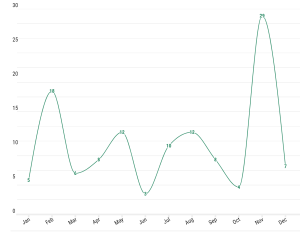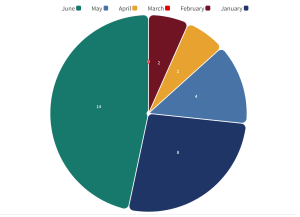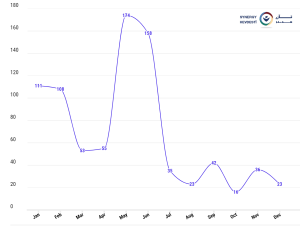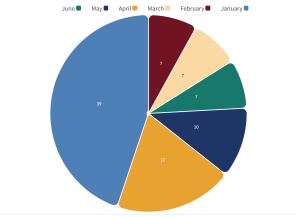Executive Summary
Since the early of 2022 until the end of June 2023, Turkey and Turkish-backed factions affiliated with the opposition Syrian National Army (SNA) carried out 1,073 strikes against areas in north and northeast Syria, killing 57 civilians, including seven children and five women, while injuring 185 others among them 24 children and five women.
Turkish attacks with war drones have been the deadliest for civilians in north and northeast Syria over the past year and a half. There have a been a total of 152 drone attacks, killing 41 civilians, including three children and five women, and injuring 80 further civilians, among them 17 children and two women.
921 incidents of artillery and rocket shelling were carried out by Turkish forces and Turkish-backed SNA factions on areas in north and northeast Syria, in which 16 civilians were killed among them four children and further 105 were injured, including seven children and three women.
The population in north and northeast Syria where the Syrian Democratic Forces (SDF) are in control live in constant anxiety, insecurity and instability, as a result of the repeated Turkish attacks with either artillery and rocket shelling or warplanes and drones. Dozens of civilians have been killed or injured since the beginning of 2022. Moreover, the wave of illegal immigration seeking humanitarian asylum abroad has increased more than any other time since the conflict started in Syria.
The Turkish attacks have had a disastrous impact on the civilians’ lives in areas in northeast Syria which has become a resort for hundreds of thousands of Internally Displaced Persons (IDPs), exacerbated the already existing humanitarian crisis and damaged many residential areas, service and critical facilities in a time when the region’s economy is in free fall and has got an already decimated infrastructure.
The Turkish aggressions have targeted all the areas in northeast Syria on the Syrian-Turkish border and al-Shahbaa region in northern Aleppo although it is included in the De-escalation/Ceasefire Agreement signed between Turkey, the US and Russia following the Turkish military operation “Peace Spring” in October 2019.
In its attacks on north and northeast Syria, Turkey did not regard the protection of civilians’ lives according to the International Humanitarian Law (IHL)’s principle of proportionality. It caused excessive loss of civilian lives, subjected them to injuries, inflicted damages to civilian objects and failed to take necessary precautions/measures to spare the occurrence of incidental damages among the civilians to the maximum extent possible.
The information documented by Synergy Association for Victims demonstrates that Turkey’s artillery and rocket shelling during the first half of 2023 on areas located on the contact lines between Turkey and the SDF-held in north and northeast Syria had killed five civilians and injured 16 others while only two SDF fighters were killed and five were wounded.

Total toll of civilian and military casualties due to Turkish artillery and rocket shelling on areas in north and northeast Syria during the first half of 2023.
On the other hand, Turkish drone attacks on areas in north and northeast Syria during the first half of 2023 had caused the death of 16 civilians and the injury of nine others and had also killed 23 SDF fighters and injured seven others.

Total toll of civilian and military casualties due to Turkish drone attacks on areas in north and northeast Syria during the first half of 2023.
IHL’s principle of proportionality prohibits launching attacks on legitimate military targets which may be expected to cause incidental loss of civilian lives, injury to civilians, damage to civilian objects, or a combination thereof, which would be excessive in relation to the concrete and direct military advantage anticipated.[1]
In all stages of any attack, affirmation should be made that the principle of precaution must be applied in conjunction with, and independently, the principle of proportionality. In other words, even if the incidental anticipated loss, injury of civilians and the damage inflicted to civilian objects are not excessive compared to the concrete and direct military advantage anticipated, the attacker must, despite all, take all possible precautions to select means and methods of warfare that may be avoiding incidental damage amongst civilians to the greatest extent possible.
Introduction
Since the beginning of 2022, Turkey has escalated its bombardment on areas in north and northeast Syria although it is a part of the Astana Talks that aim to achieve a de-escalation in Syria, and also a part of other separate agreements with each of the US and Russia. Turkey’s strikes did not only target military objects, but also the densely populated areas, several critical facilities and oil, gas and power sources.
During the first half of 2022, 52 Turkish drone attacks targeted areas of north and northeast Syria in which three civilians were killed, including two children, and injured 20 others. In the second half of 2022, further 70 Turkish drone and warplane attacks killed 22 civilians among them a woman and injured 51 others, including 16 children. In the first half of 2023, 30 Turkish drone attacks caused the death of 16 civilians and the injury of nine others.

Total toll of the Turkish drone attacks on areas of north and northeast Syria during 2022.

Total toll of the Turkish drone attacks on areas of north and northeast Syria during the first half of 2023.
Artillery and rocket shelling carried out by Turkey and the SNA’s factions on areas of north and northeast Syria during the second half of 2022 were four times the first half, as no less than 175 took place killing two civilians and injuring 11 others. The attacks escalated in the second half of 2022 amounting to 659 attacks during which nine civilians, among them a kid, were killed while 78 others were injured. In the first half of 2023, no less than 87 bombardment took place in which five civilians were killed and 16 others were injured.

Total toll of the Turkish artillery and rocket shelling on areas in north and northeast Syria during 2022.

Total toll of the Turkish artillery and rocket shelling on areas of north and northeast Syria during the first half of 2023.
On November 20, 2022, the Turkish airstrike targeted civilian objects, including a school and a hospital, equipped to offer medical services to children. The hospital was formerly used as COVID-19 care facility in Ayn al-Arab/Kobanî located in Aleppo countryside. The Turkish airstrike also targeted grain silos in ad-Darbasiyah countryside located in al-Hasakah governorate and a power plant in the countryside of al-Malikiyah/Derik.
Turkey carried out successive airstrikes on at least two sites; the kids’ hospital in Kobanî and the power plant in al-Malikiyah/Derik. After shelling both sites for the first time, it hit the two sites again after medical teams, civilians and journalists gathered in the scene.
Targeting the primary school and the kids’ hospital in Kobanî coincided the World Children’s Day that marks November 20 of each year and calls for the children’s protection, health, and peace worldwide and devotes itself to defend, promote and celebrate the children’s rights and render them to discussions and actions to build a better place for the children.
The scope of the Turkish attacks widened after mid-2022, becoming more aggressive. Turkish planes pounded several critical facilities and power, gas and oil sources rendering them inoperable and denying hundreds of thousands of people from energy. Millions of others were affected across Syria at the time when the region already suffers from dilapidated infrastructure primarily due to the ongoing conflict in the country since 2011.
The advance in the scale of Turkish aggressions on areas in northeast Syria indicates Turkey’s intention to destroy the region’s economy and deprive the residents from their basic rights and services.
The damage inflicted on the energy infrastructure has disastrously affected the civilians’ lives in northeast Syria which has become a resort for hundreds of thousands of IDPs and has exacerbated the already existing humanitarian crisis. The attack on the power plant near al-Malikiyah/Derik has caused significant power cuts in many regions in al-Hasakah governorate. The same power plant feeds electricity to Allouk Water Station, the only source for water in northern Syria that serves approximately 800,000 people in the region, notably in al-Hasakah City and Tall Tamer town, as well as their countrysides. Water is trucked from Allouk Station for the camps of al-Hol, al-Areesha, Washokani/al-Twinah, according to the International Committee of the Red Cross (ICRC).
Targeting gas and oil facilities caused acute fuel shortage which has been an existing crisis in northeast Syria and has left civilians struggling to find cooking and heating fuel for winter.
The Turkish attacks have already led to displacement. It is definite that the attacks, in case they continue, will strain the humanitarian response efforts that have already been exhausted by previous Turkish incursions.
In a report issued on December 7, 2022, Human Rights Watch (HRW) stated “the Turkish airstrikes since November 20, 2022, are inflicting damage on densely populated areas and critical infrastructure in north and northeast Syria and exacerbating an already catastrophic humanitarian crisis for Kurds, Arabs and other communities in the region.”
On December 21, 2022, Synergy Association for Victims released a report titled “The Increase of Turkish Attacks on Northeast Syria Threatens Civilians’ Lives and Jeopardizes their Basic Rights”, documenting the increase of Turkish military attacks against areas in north and northeast Syria between November 20-30, 2022, during which Turkish planes struck populated areas, several critical facilities and oil and energy sources and caused the death of 11 civilians, including a journalist and injured others.
Synergy joined a statement issued on November 29, 2022 and signed by 200 Syrian organizations that strictly condemned the continuous threats and hostilities in northern Syria. The statement calls on the UN Security Council to immediately intervene to stop the hostilities and take firm procedures to prevent the instability or any new military operations in northern Syria, notably that previous military operations have caused the displacement of tens of thousands of the indigenous people and documented myriad of human rights violations by international organizations and UN independent bodies on Syria.
Violating the Principle of Proportionality in Armed Conflicts
The information documented by Synergy over 2022 and the first half of 2023 indicate that during its attacks on the Autonomous Administration-led areas in north and northeast Syria, Turkish forces did not consider the principle of proportionality under IHL. Data analysis illustrates that civilian casualties were heavy in incidents, where artillery and rocket shelling or drone and warplane attacks were carried out.
In July, 2022, Synergy documented the killing of three civilians and two SDF fighters, as well as the injury of 29 civilians and nine SDF fighters due to Turkish rocket and artillery shells on north and northeast Syria. Furthermore, in December 2022, one civilian was killed, and six others were injured while only one SDF fighter was killed.
On the other hand, the information documented by Synergy over the first half of 2023 shows that Turkish artillery and rocket shelling on areas in north and northeast Syria killed five civilians and injured 16 others while only two SDF fighters were killed and five were injured.
The same applies to victims of Turkish drone attacks supposed to be precise. Yet, Turkey did not consider the principle of proportionality in them either. Turkish drone attacks in November 2022 injured 27 civilians and 20 SDF fighters, while they killed six civilians and 25 SDF fighters.
On the other hand, Turkish drone attacks on areas in north and northeast Syria during the first half of 2023 caused the death of 16 civilians and injured 9 others, while 23 SDF fighters were killed and seven were injured.
Legal Liability and Recommendations
The Turkish government persistence in bombarding the populated areas violates the IHL’s basic principles and amounts to violation of the laws of armed conflict. The laws of war strictly prohibit attacks targeting civilians or civilian objects unless they were being used for military purposes. The laws of war also prohibit indiscriminate attacks, which fail to distinguish between military and civilian targets.
Under International Law, Turkish Armed Forces must take all feasible measures to avoid, and in any event minimize, the loss of civilian life, injuries to civilians, and damage to civilian objects during military operations. This means they should strictly observe international standards and procedures with respect to their means and methods of warfare designed to prevent civilian casualties, and should robustly and transparently report airstrikes and enemy and civilian casualties.
In all circumstances, Turkey should promptly, impartially, and thoroughly investigate any civilian casualties that result from its operations. It should identify those responsible for civilian deaths resulting from violations of IHL and hold them accountable, provide compensation for wrongful civilian deaths and injuries and ex gratia payments for civilian harm.
Synergy highly condemns Turkish military attacks on areas in north and northeast Syria, calls for the end of attacks against civilians and civilian objects and respect the IHL. It further calls on:
- The Independent International Commission of Inquiry on the Syrian Arab Republic: to release a special briefing on the violations accompanying the Turkish military attacks on areas in north and northeast Syria and publish a special report on human rights violations committed by all parties to the conflict in northern Syria.
- The International, Impartial and Independent Mechanism (IIIM): to intensify collecting evidence processes in order to include all parties to the conflict and the violations perpetuated in northern Syria against civilians and civilian objects.
- War Crimes Units in the countries that their enactments allow trials under the principle of universal jurisdiction: to expand their structural investigations on international crimes in Syria to include those perpetuated throughout northern Syria by all parties to the conflict.
- The United Nations Agencies and Humanitarian Organizations: to increase relief and humanitarian efforts to achieve immediate respond to humanitarian needs ensued from military escalation, notably in light of targeting civilian objects and critical facilities and infrastructure.
Methodology
This report documents the repeated Turkish attacks on areas in north and northeast Syria based on data analysis collected by our field researchers and on statements of witnesses, victims, survivors, and their families between January 1, 2022 and the end of June 2023, as well as the impacts of such attacks on civilians.
For the purpose of preparing this report, Synergy collected the statements of 28 witnesses, survivors and families of civilian victims of the Turkish attacks, documented their accounts and testimonies since we are aware of the bulk of our responsibility towards the victims. Our strategy adopts an approach that focuses on the victims’/survivors’ experiences, perspectives and priorities as an essential part of our daily work, in addition to seeking multiple perspectives to develop thorough and analytical understanding of the events and adheres to the highest degrees of accuracy and integrity.
In addition to the interviews, Synergy reviewed a set of open sources that included information on the Turkish attacks on north and northeast Syria, cross-checked all the information and used much of it.
You may read and download the full version of this report (32 pages) in PDF format by clicking here.
————
[1] Article 51 (5) (b) First Additional Protocol, and Rule (14) of the Customary International Humanitarian Law.

